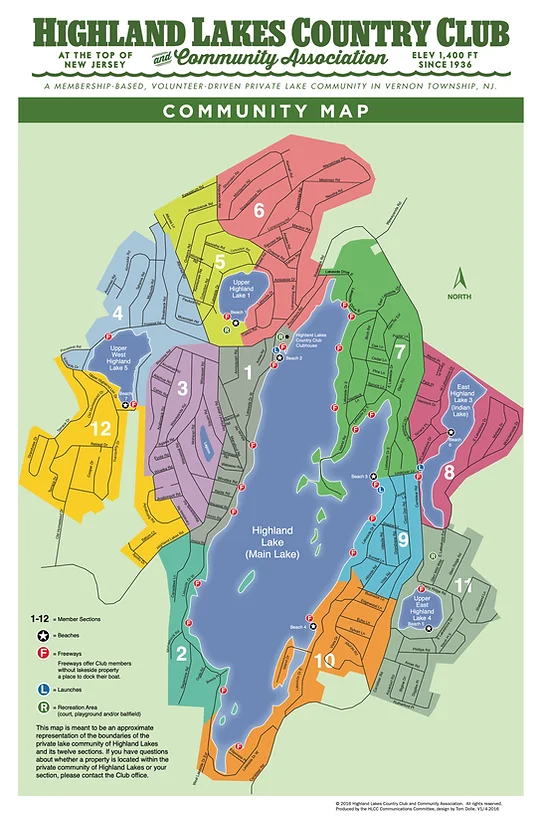Dams AND
Lake Health
The dams impounding the five lakes have been rehabilitated to the standards of current law, administered by the New Jersey Bureau of Dam Safety, and undergo inspections every two years by an engineering firm.
Like all lake communities, there are both proactive and reactive measures taken to maintain the quality of a lake so that we can enjoy them. Aquatic conditions (algae, weeds, etc.) together with water chemistry are handled by a team of consultants (Solitude Lake Management and Princeton Hydro, LLC) working in close cooperation with the Club’s general manager and Ecology Committee.
The Club’s seven beaches and the swim lanes are tested for E. coli throughout the bathing season, and results are reported to the Sussex County Health Department.
Beaches and Swimming
There are five lakes and seven beaches to choose from, which are staffed by certified lifeguards in the summer months, and are subject to inspection by the Sussex County Department of Health and Environmental Services.
Beach Hours
Lifeguards will be on duty at the following beaches during the below listed times, subject to staffing availability.
May 25 - June 30: (weekends only)
Beaches 1, 3 & 7 - 10 AM - 5:30 PM
July 1 - August 11:
Beach 1 - 9 AM - 5 PM
Beach 2 - TBD
Beach 3 - 10 AM - 6 PM
Beach 4 - TBD
Beach 5 - TBD
Beach 6 - TBD
Beach 7 - 10 AM - 6 PM
August 21 - September 2:
Beach 1, 3 & 7 - TBD
BBQ Grills at the Beach
Grills are allowed on Beaches 3 and 5 ONLY, in the grassy area where the picnic tables are, away from the beach patrons, lifeguard equipment, and any playground equipment. There are also BBQs in the playground and picnic area adjacent to the Clubhouse.
Learn to Swim
SWIM LESSONS are made available to children of all ages (members only). Those lessons are taught by a select group of Highland Lakes’ lifeguards who are certified as Water Safety Instructors.
Swimming Safety
- Always swim with a buddy; never swim alone.
- Read and obey all rules and posted signs.
- Swim in areas that are supervised by a lifeguard.
- Children or inexperienced swimmers should take extra precautions, such as wearing U.S. Coast Guard-approved life jacket when around water.
- Watch out for the “dangerous too’s”- too tired, too cold, too far from safety, too much sun, too much strenuous activity.
- Set water safety rules for your family based on swimming abilities (for example, inexperienced swimmers should stay in water less than chest deep).
- Be knowledgeable of the water environment you are in and its potential hazards, such as deep and shallow areas, currents, depth changes, obstructions, and where the entry and exit points are located. The more informed you are, the more aware you will be of hazards and safe practices.
- Know how to prevent, recognize and respond to emergencies.
- Use a feet-first entry when entering the water.
- Enter head-first only when the area is clearly marked for diving and has no obstructions.
- Do not mix alcohol with swimming, diving, or boating. Alcohol impairs judgment, balance and coordination, affects your swimming and diving skills, and reduces your body’s ability to stay warm.
- Know how to prevent, recognize and respond to emergencies.


